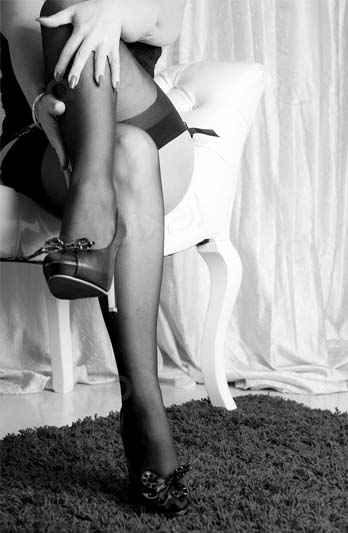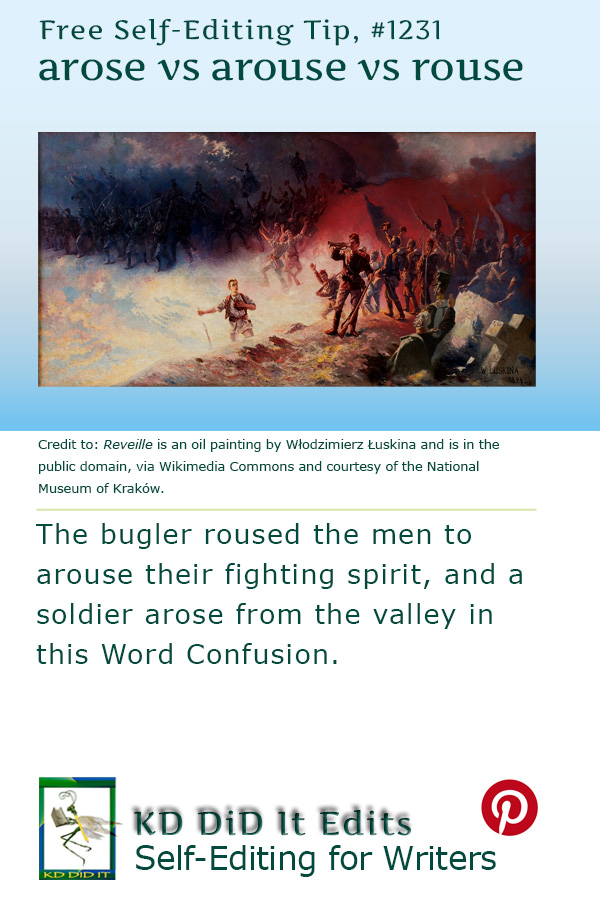It started with my being wrong *cough, cough*. I read about a woman rousing a man, and it was definitely not as a matter of waking him up. I assumed that she was arousing him. It turns out that one can use arouse and rouse in both a waking up and as a method of sexual stimulation.
It was while researching this word confusion that I ran across arose as also being a confusion with arouse. Who knew??
So, arose, a past tense of arise, is all about getting up (yep, it includes waking up), getting ahead, rising up, etc.
Arouse and rouse are both about waking up and getting excited, stirring up emotions.
Rouse, however, also includes reveille, partying, alcohol (stirring liquids like beer!), naval hauling, and startling game.
Exploring Later . . .
You might be interested in “Raise versus Rise“.
Word Confusions . . .
. . . started as my way of dealing with a professional frustration with properly spelled words that were out of context in manuscripts I was editing as well as books I was reviewing. It evolved into a sharing of information with y’all. I’m hoping you’ll share with us words that have been a bête noire for you from either end.
If you found this post on “Arose vs Arouse vs Rouse” interesting, consider subscribing to KD Did It, if you’d like to track this post for future updates.
| Arose | Arouse | Rouse |
|---|---|---|

The Resurrection of Christ is under the Public Domain Mark 1.0 license, via Gary Stockbridge. — And Jesus arose from the dead. |

Sexy Stockings and Heels is under the CC0 license, via RawPixel. — Some might be aroused by this image. |

White Tiger Rousing is Basile Morin‘s own work and is under the CC BY-SA 4.0 license, via Wikimedia Commons. |
| Part of Grammar: | ||
| Morpheme: arise
Verb, intransitive 1, 2 Third person present verb: arises |
Verb, intransitive & transitive
Gerund: arousing Third person present verb: arouses |
Noun 1, 2; Verb, intransitive & transitive
Plural for the noun: rouses Third person present verb: rouses |
| Verb, intransitive: To get up from sitting, lying, or kneeling
To awaken
To move upward
To come into being, action, or notice
To result or proceed
To come into being 2
To spring or proceed as a consequence (followed by from)
To get or stand up, as from a sitting, kneeling, or lying position To come into notice To move upwards
|
Verb, intransitive: To become awake Verb, transitive:
Awaken (someone) from sleep |
Noun: A rousing 1 A signal for rousing
[Archaic] A carouse 2 [Obsolete] A bumper of liquor
[Obsolete] Drink, toast A carousal
Verb, intransitive:
Verb, transitive:
Cause to feel angry or excited
Stir (a liquid, especially beer while brewing) [Archaic; Nautical] Haul (something) vigorously in the specified direction |
| Examples: | ||
| Verb, intransitive: He arose from his chair when she entered the room. He arose at sunrise to get an early start to the beach. A thin curl of smoke arose lazily from the cabin. New problems arose daily. It is difficult to foresee the consequences that arose from this action. After such destruction many problems in resettlement often arose. Guilt arose from my actions. They arose with the end of the meeting. “Shall we, after the manner of Homer, pray the Muses to tell us ‘how discord first arose’?” (Socrates). “This had Zarathustra spoken to his heart when the sun arose: then looked he inquiringly aloft, for he heard above him the sharp call of his eagle” (Nietzsche). |
Verb, intransitive: At dawn the farmers began to arouse. “In fact, it is not an isolated stimulus that leaves an engram, but the totality of the stimuli at any moment; consequently any portion of this totality tends, if it recurs, to arouse the whole reaction which was aroused before” (Russell). “She was more interested in the way fashion played out in popular culture, the way it could arouse, empower, and provoke” (Givhan). Verb, transitive: The letter aroused in him a sense of urgency. He had an ability to influence the audience and to arouse the masses. I was surprised to find that this look aroused me. This movie usually arouses the male audience. She had been aroused by the telephone. The report aroused them to take action. The insult aroused him to anger. |
Noun: Let’s have us a rouse! The men need a good rouse to give them heart. “The Rouse and Reveille are bugle calls played to signify different parts of the day” (The Rouse). Have the bugler give the rouse. Ian, a rouse to you! “Fill the cup, and fill the can: Verb, intransitive: He was roused by the drunken men in the street. The crowds were roused to fever pitch by the drama of the race. “‘The rabble had already been roused before she got there,’ Gherland sputtered” (Barnhill). “One February morning, the cadets are roused from their beds at two A.M. and driven out into the glitter” (Doerr). Verb, transitive: Once the enemy camp was roused, they would move on the castle. She’d just stay a few more minutes, then rouse herself and go back. The dogs roused the fox from its lair. “Hazel made his way through the grass, roused the first rabbit he found — who happened to be Bluebell — and sent him to fetch Bigwig, Blackberry, and Fiver” (Adams). The crowds were roused to fever pitch by the drama of the race. His evasiveness roused my curiosity. It rouses the beer as the hops are introduced. Rouse the cable out. |
| Derivatives: | ||
| Verb, intransitive: rearise, rearose | Adjective: arousable, aroused, unarousable, unarousing Noun: arousability, arousal, arouser Verb: rearouse |
Adjective: rousable, rousing, unroused Adverb: rousingly Noun: rousedness, rouser |
| History of the Word: | ||
|
Late 16th century from rouse, on the pattern of the pair of rise, arise. |
|
C’mon, get it out of your system, bitch, whine, moan . . . which words are your pet peeves? Also, please note that I try to be as accurate as I can, but mistakes happen or I miss something. Email me if you find errors, so I can fix them . . . and we’ll all benefit!
Satisfy your curiosity about other Word Confusions on its homepage or more generally explore the index of self-editing posts. You may also want to explore Book Layout & Formatting Ideas, Formatting Tips, Grammar Explanations, Linguistics, Publishing Tips, the Properly Punctuated, Writing Ideas and Resources, and Working Your Website.
Resources for Arose vs Arouse vs Rouse
Some of these links may be affiliate links, and I will earn a small percentage, if you should buy it. It does not affect the price you pay.
Adams, Richard. Watership Down. Originally published London: Rex Collings Ltd, 1972. Scribner, 2009. <https://amzn.to/46xeaOj>. Ebook.
Apple Dictionary.com
Barnhill, Kelly. The Girl Who Drank the Moon. Algonquin Young Readers, 2016. <https://amzn.to/3sWgGjm>. Ebook.
Cambridge Dictionary: Arouse or Rouse?
Dictionary.com: arise, arouse, rouse
Doerr, Anthony. All the Light We Cannot See. Scribner, 2014. <https://amzn.to/47uZ6SN>. Ebook.
The Free Dictionary: arouse
Givhan, Robin. “Helen Gurley Brown’s Fashion Sense, The power of cleavage.” The Daily Beast. 14 Aug 2012. Accessed 26 Nov 2023. <https://www.thedailybeast.com/helen-gurley-browns-fashion-sense-the-power-of-cleavage>.
Merriam-Webster: rouse
Nietzsche, Friedrich. “The Sign.” Thus Spake Zarathustra: A Book For All And None. Originally published 1883. Grapevine, 2019. <https://amzn.to/3Ri6L0Q>. Ebook.
“The Rouse and Reveille.” Australian Army. n.d. Accessed 26 Nov 2023. <https://www.army.gov.au/about-us/history-and-research/traditions/rouse-and-reveille>.
Russell, Bertrand. The Analysis of Mind. Originally published 1921. Project Gutenberg, 2013. <https://www.gutenberg.org/files/2529/2529-h/2529-h.htm>. Ebook.
Socrates. “Conversation with Glaucon.” The Free Dictionary. n.d. Accessed 26 Nov 2023. <https://plato.thefreelibrary.com/Republic/2-28#arose>.
Tennyson, Alfred, Lord. “The Vision of Sin.” Originally published London: Edward Moxon, 1842. Black Cat Poems.com. <http://www.blackcatpoems.com/t/the_vision_of_sin.html>. Web.
Vocabulary.com: rouse
Pinterest Photo Credits
Reveille is an oil painting by Włodzimierz Łuskina and is in the public domain, via Wikimedia Commons and courtesy of the National Museum of Kraków.


